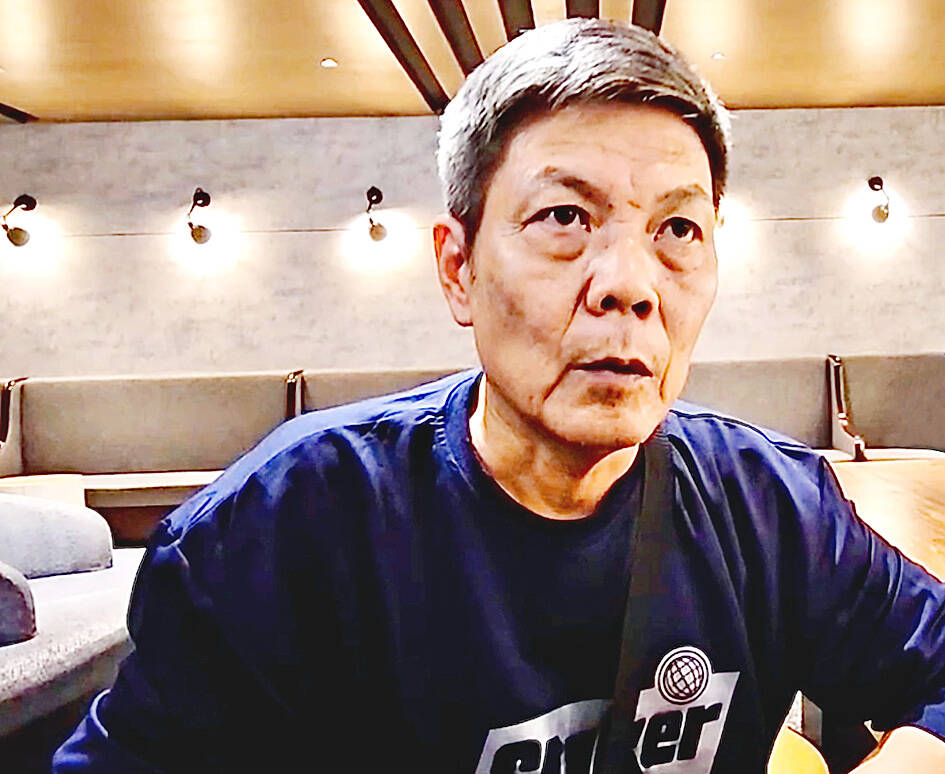A Chinese dissident who was stuck inside a transit area in Taiwan Taoyuan International Airport after he refused to fly on to China yesterday said he has arrived in Canada after being granted asylum.
Chen Siming (陳思明) arrived in Taiwan on Sept. 22 after traveling through Thailand and Laos. When he landed at Taoyuan airport he refused to reboard, asking for assistance to resettle in a third country.
He spent almost two weeks living in the transit area and immigration office of the airport, where he said he was looked after by authorities.

Photo courtesy of a reader
There was concern about how long he would be there, after a similar case in late 2018 saw two dissidents spend four months at Taoyuan airport.
Chen said that he had arrived in Vancouver on Saturday.
“I was able to successfully obtain political asylum in Canada,” he said, crediting the international attention his case received and various rights groups, as well as the governments of Taiwan and Canada, and the UN High Commissioner for Refugees (UNHCR).
“The three parties handled my case quickly in the spirit of humanitarian care,” he said. “This kindness will be remembered forever. I would like to express my sincere gratitude.”
Chen is a known activist in China who regularly commemorated the Tiananmen Square Massacre of June 4, 1989, and has been repeatedly detained around the anniversary.
He fled China for Laos in late July, but after human rights lawyer Lu Siwei (盧思位) was arrested in the country and deported, Chen was advised to leave.
He arrived in Thailand, where he said he was granted interim asylum status by the UNHCR, before booking a flight to Guangzhou, China, which transited in Taiwan.
Dissident and political commentator Guo Baoshen (郭寶勝), who had been assisting Chen, said Chen was “very lucky” to have been transferred so quickly.
In late 2018, Yan Bojun (顏伯鈞) and Liu Xinglian (劉興聯) spent about 100 days in Taoyuan airport before Taiwan authorities said they could enter, but only after they flew to Singapore and then returned on short-term humanitarian visas.
Taiwan does not have a formal refugee pathway, and tensions between Taipei and Beijing — which has vowed to annex Taiwan — make the topic of Chinese asylum seekers a politically sensitive and complicated issue.

Hong Kong-based American singer-songwriter Khalil Fong (方大同) has passed away at the age of 41, Fong’s record label confirmed yesterday. “With unwavering optimism in the face of a relentless illness for five years, Khalil Fong gently and gracefully bid farewell to this world on the morning of February 21, 2025, stepping into the next realm of existence to carry forward his purpose and dreams,” Fu Music wrote on the company’s official Facebook page. “The music and graphic novels he gifted to the world remain an eternal testament to his luminous spirit, a timeless treasure for generations to come,” it said. Although Fong’s

China’s military buildup in the southern portion of the first island chain poses a serious threat to Taiwan’s liquefied natural gas (LNG) supply, a defense analyst warned. Writing in a bulletin on the National Defense and Security Research’s Web site on Thursday, Huang Tsung-ting (黃宗鼎) said that China might choke off Taiwan’s energy supply without it. Beginning last year, China entrenched its position in the southern region of the first island chain, often with Russia’s active support, he said. In May of the same year, a Chinese People’s Liberation Army Navy (PLAN) force consisting of a Type 054A destroyer, Type 055 destroyer,

Actor Darren Wang (王大陸) was questioned by prosecutors for allegedly orchestrating an attack on a taxi driver after he was allegedly driven on a longer than necessary route in a car he disliked. The questioning at the New Taipei City District Prosecutors’ Office was ongoing as of press time last night. Police have recommended charges of attempted murder. The legally embattled actor — known for his role in the coming-of-age film Our Times (我的少女時代) — is under a separate investigation for allegedly using fake medical documents to evade mandatory military service. According to local media reports, police said Wang earlier last year ordered a

POLICY UNCHANGED? Despite Trump’s remarks, US Secretary of State Marco Rubio assured that US policy toward Taiwan has remained consistent since the 1970s US President Donald Trump on Wednesday again refused to make clear his stance on protecting Taiwan from a hypothetical takeover by China during his presidency. Asked by a reporter during a Cabinet meeting whether it was his policy that China would never take Taiwan by force while he is president, Trump declined to give a definitive answer. “I never comment on that,” he said. “I don’t comment on it because I don’t want to ever put myself in that position.” Trump also reiterated that he has a “great relationship” with Chinese President Xi Jinping (習近平) and said that Washington welcomes good relations with